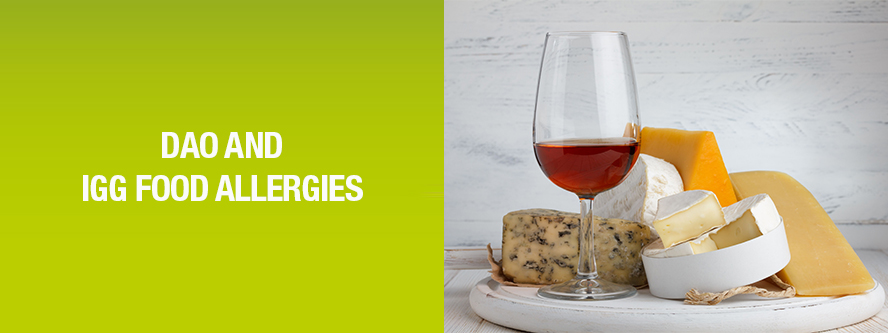DAO and ImuPro
Certain symptoms such as headache, itchy skin, IBS, dizziness can originate from several causes, but are very often related to food intolerance or food allergies. Immediate allergies, mediated by IgE, are easy to identify as the symptoms appear only minutes after the ingestion. Food intolerance and delayed food allergies, mediated by IgG remain often undiagnosed due to the late appearance of symptoms, it sometimes may take hours to several days. ImuPro may identify IgG mediated delayed food allergies and the avoidance of the concerned foods often lead to a significant relief. But sometimes certain symptoms may persist, even if all IgG positive foods are avoided. In this case either the symptoms are not related to food or another underlying mechanism of food intolerance prevails.
While lactose intolerance is mainly associated with gastro-intestinal disorders, histamine intolerance is most likely associated to symptoms like gastrointestinal disorders, hypotension, headache, nasal congestion, fatigue, arrhythmia, skin disorders including rash-like symptoms or itchy skin.
What is histamine?
Histamine is a natural and important compound of the human body and regulates blood pressure, the immune system and is involved in the nervous system. In general the body is able to balance the histamine release. In allergic reactions excessive release of histamine is responsible for the allergic symptoms. In this case anti-histamine may help to reduce the released of histamine.
But histamine is also present in high concentration in certain foods. Another source of histamine may be your gut flora. Particularly when you have SIBOS (small intestinal bacterial overgrowth syndrome) with the participation of putrefaction flora.
What is histamine intolerance?
Healthy people have an enzyme called Di-amino-oxidase (DAO) which is present in the gut and decomposes histamine ingested with food. 3% of the population have a genetically determined severe DAO deficiency leading to manifest histamine intolerance and around 20% have a milder form of histamine intolerance. In this case symptoms mainly depend on the amount of histamine ingested or if DAO inhibitors are present. A potent DAO inhibitor is alcohol. Many subjects only symptoms of histamine intolerance when they consume alcohol, particularly red wine. But also certain medications are potent DAO inhibitors. Histamine intolerance can be caused by deficiency in vitamin B6, copper and inflammation of the intestinal mucosa.
How can you detect histamine intolerance?
Histamine intolerance mustn’t be confused with histamine release from allergic reaction. Neither IgE nor skin prick tests are able to diagnose histamine intolerance. Histamine intolerance can only be identified by testing the activity of Di-amino-oxidase (DAO) in blood.
Am I susceptible to have histamine intolerance?
If you have symptoms cited above and they don’t disappear after an ImuPro guided exclusion diet, you should check your DAO levels. If you have chronic low blood pressure, excessive nightly sweating after drinking alcohol, arrhythmia, or if just don’t like or tolerate red wine could be signs of histamine intolerance. Furthermore if you are a female and you (had) experience (d) pre-menstrual cramps as a sign of histamine intolerance.
Annexe
Foods rich in histamine
- Alcohol, esp. red wine and champagne
- Cheese
- Sea food, fish (particularly tuna, swordfish) and fish sauces
- Raw meat sausages (e.g. salami, speck)
- Sauerkraut
- Vegetables (e.g. tomatoes, spinach and eggplant)
- Fruits (e.g. strawberry, pine apple, banana)
- Chocolate
- All fermented foods are susceptible to be rich in histamine
Potent DAO-inhibitors
- Alcohol
- medications such as for example, acetylcysteine, ambroxol, aminophylline, amitryptine, chloroquine, clavulanic acid, isoniazid, metamizole, metoclopramide, propafenone, verapamil
Why wait? Do it now and get tested today!
References
- Jarisch, R.,2004: Ärztemagazin 08/2004, Histamin-Intoleranz
- Jarisch, R. “Histaminunverträglichkeit”, Thieme Verlag TB 2. Auflage
- Schmutz Helmut (Autor); Abbot, G.; Lieners C.; Mayer, I.; et.al; “Nahrungsmittelunverträglichkeit (Histamin Intoleranz)”, Sachbuch, Wien 2006
- Sattler, J; Hafner, D; Klotter, HJ; et.al; “Food-induced histaminosis under diamine oxidase (DAO) blockade in pigs: Further evidence of the key role of elevated plasma histamine levels as demonstrated by successful prophylaxis with antihistamines”; Agents and Actions; Volume 27, Numbers 1-2 / April 1989
- Maintz, L.; Noval, N.: “Histamine and histamine intolerance”, American Journal of Clinical Nutrition 2007 (85)1185-1196

